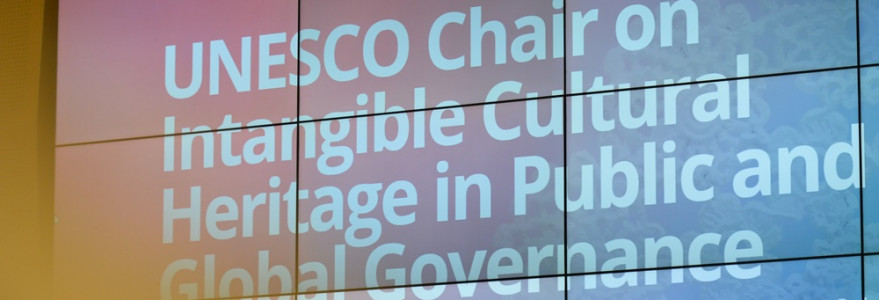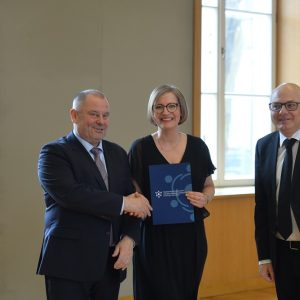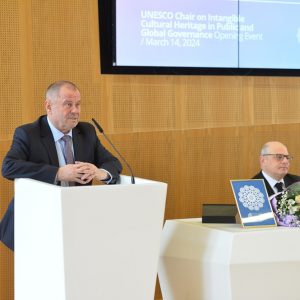On 14th March, the third UNESCO Chair was opened at the University of Warsaw. The unit is based at the UW’s Faculty of Political Science and International Studies, and deals with public and global processes regarding governing intangible cultural heritage.
“Due to the engagement of the academics, doctoral candidates and students of the Faculty of Political Science and International Studies, we can better understand our contemporary world. Today, we are opening a significant unit of the Faculty, whose aim it to facilitate the internationalisation of the entire University of Warsaw. I believe that thanks to our researchers, many people will participate in seminars, conferences and debates on issues related to intangible cultural heritage,” Prof. Alojzy Z. Nowak, the UW Rector, said at the opening of the UNESCO Chair on Intangible Cultural Heritage in Public and Global Governance.
The new unit is based at the Faculty of Political Science and International Studies of the University of Warsaw, and is headed by Prof. Hanna Schreiber.
“The Chair’s interdisciplinary team aims to investigate fundamental questions such as: how should a given community (including international community) govern heritage resources?, when heritage resources are considered to be public goods or the commons, and when they are not?, what are the criteria for effective and ethical heritage governance? Challenges of the public and global management of intangible cultural heritage will be investigated within the frameworks of the MONDIACULT 2022 Declaration, Agenda 2030, UNESCO’s Medium-Term Strategy 2022-2029, as well as the UNESCO’s Recommendation on the Ethics of Artificial Intelligence,” says Prof. Hanna Schreiber, the UNESCO Chair Holder.
Exchanging knowledge and solidarity
The UNESCO (United Nations Educational, Scientific and Cultural Organisation) is a specialised agency of the United Nations, founded in 1945. It coordinates actions related to international cooperation in education, arts, sciences and culture.
In 1992, the University Twinning and Networking – UNITWIN/UNESCO Chairs Programme was launched with the aim to facilitate knowledge exchange, scientific research, training, and inter-university collaboration, while fostering academic solidarity globally.
UNESCO Chairs act as bridges between universities, decision-makers and society. Their tasks include promoting cultural diversity and gender equality or implementing the 2030 UN Agenda for Sustainable Development.
There are currently around 950 UNESCO Chairs and forty-five UNITWIN networks worldwide, located at higher education institutions in 120 countries. In Poland, there are eleven of them, including three at the University of Warsaw. Apart from the Chair established at the Faculty of Political Science and International Studies, there are also two other units at the UW: the UNESCO Chair of Sustainable Development at the Centre for European Regional and Local Studies, and the UNESCO Chair in Women, Society and Development at the Institute for Social Studies.







